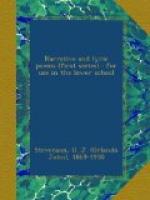And did they twine the laurel-wreath,[10]
for those who fought
so well
110
And did they honour those who liv’d,
and weep for those who fell?
What meed of thanks was given to them
let aged annals tell.
Why should they bring the laurel-wreath,—why
crown the cup with wine?
It was not Frenchmen’s blood that
flow’d so freely on the Rhine,—
A stranger band of beggar’d men
had done the venturous deed; 115
The glory was to France alone, the danger
was their meed,
And what cared they for idle thanks from
foreign prince and peer?
What virtue had such honey’d words
the exiled heart to cheer?
What matter’d it that men should
vaunt, and loud and fondly swear
That higher feat of chivalry was never
wrought elsewhere? 120
They bore within their breast the grief
that fame can never heal,—
The deep, unutterable woe which none save
exiles feel.
Their hearts were yearning for the land
they ne’er might see again,—
For Scotland’s high and heather’d
hills, for mountains, loch and glen—
For those who haply lay at rest beyond
the distant sea, 125
Beneath the green and daisied turf where
they would gladly be!
Long years went by. The lonely isle
in Rhine’s tempestuous flood
Has ta’en another name from those
who bought it with their blood:
And, though the legend does not live,—for
legends lightly die—
The peasant, as he sees the stream in
winter rolling by, 130
And foaming o’er its channel-bed
between him and the spot
Won by the warriors of the sword, still
calls that deep
and dangerous
ford
The Passage of the Scot.
—Aytoun.
[1] serried. crowded.
[2] Mareschal. Marshal, an officer of the highest rank in the French army.
[3] Duguesclin. A noted French commander, famous for his campaigns against the English in the 14th century.
[4] Dundee. John Graham of Claverhouse, Viscount Dundee, a Scottish soldier. He raised a body of Highlanders in 1689 to fight for James II against William of Orange. At the battle of Killecrankie (1689) he was mortally wounded.
[5] The Pass. The Pass of Killecrankie.
[6] Garry. A river in Perthshire, Scotland.
[7] tartan. A Scotch plaid
[8] linn. A waterfall.
[9] claymore. The heavy broadsword used by the Highlanders.
[10] laurel-wreath. The laurel is an evergreen shrub found in parts of Europe. A wreath of laurel was a mark of distinction or honour.
DICKENS IN CAMP.
Above the pines the moon was slowly drifting,
The river sang below,
The dim Sierras,[1] far beyond, uplifting
Their minarets of snow.
The roaring camp-fire, with rude humor,
painted 5
The ruddy tints of health
On haggard face and form that drooped
and fainted
In the fierce race for wealth;




